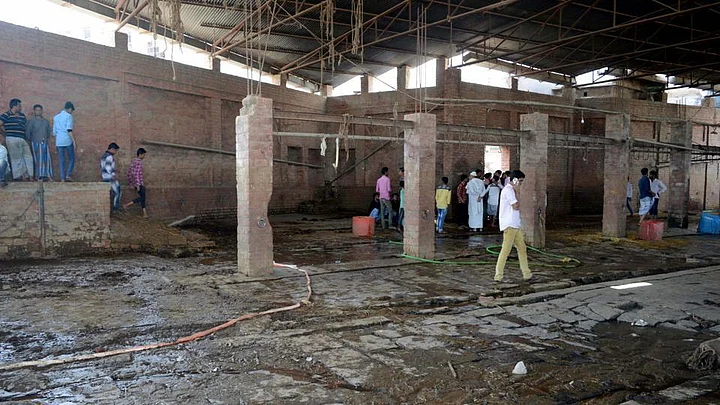Supplies are not coming forth, our work has been reduced drastically. Earlier, 150 buffaloes used to be slaughtered everyday. It has now come down to 10-20. Of 150 daily wagers in the factory, the majority is sitting idle. We have a license for our slaughterhouse. The administration has not approached us until now, but there is a sense of fear everywhere.
Even while talking to The Quint, Shakil Ahmad, MD of Al-Falah of Frozen Food, sounded completely shaken.
The change of guard in the Uttar Pradesh government has directly affected Ahmad – influx of buffaloes in slaughterhouses has reduced and all the people associated with the business are panic-stricken.
There are about 250 daily wagers and permanent workers in Ahmad’s factory. After Yogi Adityanath took oath as the chief minister, raids on the state’s butcher houses are becoming a cause of worry.
A Growing Fear
Although, only illegal slaughterhouses have been targeted by the administration until now, there’s a deep sense of fear that even the licensed slaughterhouses might face the axe.
The owner of a licensed slaughterhouse, on conditions of anonymity, said that the officers of the State Pollution Board and Central Pollution Board, come to inspect documents relating to online system, pollution, water treatment, fire safety, labour laws and dozens of other legal documents every now and then.
There is a growing fear, therefore, that any sort of lack found in these inspections may trigger a ban on the slaughterhouse.
Shutting Down Slaughterhouses Was BJP’s Election Promise
Be it the election manifesto or one of the campaign rallies, the BJP had made their promise clear – if it assumes power in the state, it will make sure that slaughterhouses are shut down through an ordinance.
In the aftermath of this, places like Ghaziabad, Meerut, Bulandshahr, Allahabad, Hathras, and Varanasi have witnessed dozens of slaughterhouses being shut down in the last three days. On Wednesday itself, several illegal slaughterhouses were sealed by the police in Lucknow.
The Quint spoke to Dinesh Chandra, the ADM of Meerut, where seven slaughterhouses were sealed.
Action has been taken, and FIRs have also been registered in cases where slaughterhouses were functioning illegally in violation of laws pertaining to labour, pollution, fire safety, water treatment and other laws.
However, Haji Shahid Akhlaq, the CEO of Shakil Export Pvt Ltd said:
We were not given any time before the slaughterhouse was sealed. The administration is also wielding its baton against licensed slaughterhouses. We have also shown them messages from ministers on WhatsApp, but to no avail.
What Does the Law Say?
For obtaining a license, a slaughterhouse has to take permission from both the state and the central government. The first go ahead is given by the State Pollution Board after proper scrutiny. It’s on this basis of this initial permission that the Agricultural and Processed Food Products Export Development Authority (APEDA), which comes under the Ministry of Commerce and Industry, gives license to the slaughterhouse for two years.
According to the APEDA statistics:
- In 2015-16, India exported buffalo meat worth Rs 26,681.56 crore.
- There are 75 slaughterhouses in the country that have been granted license by the APEDA.
- Out of these, 41 are in Uttar Pradesh.
If the export of buffalo meat in Uttar Pradesh is banned, the state exchequer will suffer an annual loss of Rs 11,350 crore, according to one estimate.
The UP government, however, on 22 March, made it clear that there will be no interference in the working of licensed slaughterhouses.
Licensed slaughterhouses are allowed to function, there should be no confusion in that.Siddharth Nath Singh, Uttar Pradesh minister
In the middle of all of this, the government should shed some light on the mystery surrounding the issue, as the question is not merely about the export of meat.
If slaughterhouses are shut down, industries, including leather, poultry feed made out of crushed bones and handicrafts made out of buffalo horns – will also suffer immensely, for thousands of people employed in these industries.
(This story was first published on QuintHindi.)
(At The Quint, we question everything. Play an active role in shaping our journalism by becoming a member today.)
